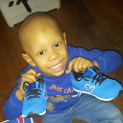Molecular Signature of Inflammation
Background
NK or T cell-mediated cellular immunotherapy holds significant promise to successfully treat pediatric malignancy. In particular, genetically modified NK or T cells can mediate highly efficient and targeted clearance of tumor cells in young patients. Recent developments related to transduction of Chimeric Antigen Receptors (CARs) into NK or T cells have given us a renewed sense of optimism in the clinic.
CARs contain the variable regions of heavy and light chains from an antibody that is specific for a tumor antigen in NK or T cells and generate potent anti-tumor responses. One such antigen, CD19, is ubiquitously expressed in B cells and therefore targeting CD19 is an effective way to clear B cell Acute Lymphoblastic Leukemia (B-ALL). Use of anti-CD19 antibody as an ectodomain of a CAR (CD19-CAR) in NK or T cells significantly improves the specificity and the efficacy of treating B-ALL patients.
Project Goal
Multiple Cancer Centers are currently using CD19-CAR to treat B-ALL patients. While the tumor-specific cytotoxicity significantly increases in these patients, an associated 'cytokine-release syndrome' mediated by CAR-transduced T cells causes severe inflammatory responses and even death of some patients. Using NK cells as models, we have recently performed detailed analyses of signaling cascades and have identified unique signaling molecules that are exclusively responsible for the production of inflammatory cytokines and chemokines but not for cytotoxicity. Our findings open ways to novel immunotherapeutic approaches to successfully treat pediatric B-ALL patients without causing deleterious 'cytokine-release syndrome'.
Project Update
Funding from Alex's Lemonade Stand Foundation helped sustain Dr. Malarkannan's project while he applied for funding from the National Institutes for Health. In 2014 he was awarded a five-year NIH R01 Research Project Grant for "Molecular signature of inflammation."

